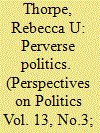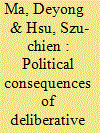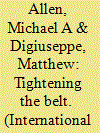| Srl | Item |
| 1 |
ID:
101814


|
|
|
|
|
| Publication |
2011.
|
| Summary/Abstract |
This article examines proposals for delegating internal security - policing - in peacekeeping missions to non-state institutions. It first outlines the putative benefits in doing so. It then examines the difficulties in implementing such a strategy - problems of choosing, monitoring and regulating non-state providers. The article argues that while adopting this strategy may, or may not, provide short-term benefits in terms of public safety, it represents an expansion of peacekeeping responsibilities that has unpredictable political consequences.
|
|
|
|
|
|
|
|
|
|
|
|
|
|
|
|
| 2 |
ID:
133629


|
|
|
|
|
| Publication |
2014.
|
| Summary/Abstract |
What are the domestic political consequences of peacemaking for dictators? The conventional wisdom suggests that nations are better off reaching settlements that allow them to avoid the costs of war.1 The effectiveness of cooperation with autocracies is of interest to policy makers and international-relations theorists alike. Debates over issues such as the First Step Agreement with Iran or U.S.-China policy have focused on the effectiveness of engagement (defined as attempts to influence the behaviors of a target state through positive inducements).2 States sometimes cooperate with their rivals, expecting that engagement will bolster the political fortunes of moderates in the target regime
|
|
|
|
|
|
|
|
|
|
|
|
|
|
|
|
| 3 |
ID:
141306


|
|
|
|
|
| Summary/Abstract |
I examine the political consequences of prison development in the United States. I theorize that the prison apparatus not only upholds a system of racial hierarchy and class stratification, but also links the economic stability of lower-class, rural whites to the continued penal confinement of poor, urban minorities. Analysis of an original dataset suggests that local reliance on existing prison infrastructure throughout many economically-depressed rural communities strengthens political support for harsh criminal punishments and militates against reform efforts. Political representatives have powerful interests in protecting rural prison investments, regardless of their actual economic impact in host communities. The evidence indicates that rural prison development contributes to the perceived economic viability and political power of rural areas, while reinforcing forms of punishment that destabilize poor urban neighborhoods and harm politically marginalized populations.
|
|
|
|
|
|
|
|
|
|
|
|
|
|
|
|
| 4 |
ID:
159539


|
|
|
|
|
| Summary/Abstract |
Recent research suggests that both electoral democracy and deliberative democracy under a nondemocratic regime may help to sustain existing authoritarian rule but is likely to eventually lead to the democratization of authoritarian regimes by eroding its basis in the long term. However, few studies have used comparative methods to empirically analyze the political effects of these two types of democracy together. In this article, we use survey data and in-depth interviews to empirically analyze two local political reform experiments in China. Four fieldwork sites were selected: two where democratic experiments have been implemented and two where no political reform has been implemented. We compared the political consequences of the two locations of democratic reform experimentation using indicators such as political trust, administrative performance, and democratic aspirations. The results show that the electoral democracy experiment delivered better governance and higher political legitimacy than the deliberative democracy experiment, while deliberative democracy performs better than the usual township governance system. Although the results show that the electoral democracy experiment fosters higher democratic aspiration, strong evidence verifying the causal mechanism between deliberative democracy experiment and appeals for democracy has not been found. Based on the empirical findings, we discuss the implications of the two experiments for China's politics.
|
|
|
|
|
|
|
|
|
|
|
|
|
|
|
|
| 5 |
ID:
129640


|
|
|
|
|
| Publication |
2014.
|
| Summary/Abstract |
Though still a small percentage of the total stock of Foreign Direct Investment (FDI) present in European countries, FDI coming from China has risen dramatically in the European Union (EU) since 2009. This introduction to the special issue on "The Politics of Hosting Chinese Investment in Europe" examines the political fears aroused by this recent surge and by the prospect of continued Chinese direct investment in European economies. After surveying patterns of Chinese investment in the EU, this introduction asks what is distinctive about the potential economic and political consequences of Chinese FDI and lays out the argument for and against treating Chinese FDI as sui generis
|
|
|
|
|
|
|
|
|
|
|
|
|
|
|
|
| 6 |
ID:
126471


|
|
|
|
|
| Publication |
2013.
|
| Summary/Abstract |
International relations scholars have previously argued that states facing budget constraints will join alliances to free resources for domestic spending. In this paper, we focus on the primary mechanism by which leaders have relaxed this constraint: sovereign borrowing. Sovereign debt enables states to maintain stable tax rates while increasing expenditures to confront budgetary emergencies. Affordable access to credit, then, serves as both a source of power and an important buffer between security and the political consequences of fiscal policy. States that lack the confidence of investors must make tough choices between continued security and their electoral fortunes. We suggest that as governments lack access to affordable credit, they will substitute military capacity with alliance formation. Alliances provide a means for leaders to offset the loss of flexibility from diminished access to credit without disturbing the domestic political economy. Using previous models of alliance formation as a guide, our empirical evidence indicates that states that have a hard time borrowing are more likely to form an alliance than those states with affordable access to credit markets.
|
|
|
|
|
|
|
|
|
|
|
|
|
|
|
|
| 7 |
ID:
191997


|
|
|
|
|
| Summary/Abstract |
How do traumatic experiences shape individuals’ political behavior? Political scientists have investigated the behavioral changes caused by natural disasters and terrorist attacks, but no work to date has investigated the political consequences of such events using the framework of psychological trauma. In this study, I develop a theory of posttraumatic political response that explains how traumatic events influence voter turnout. To test this theory, I identify the effects of three different types of traumatic events: Black church arson attacks, mass shootings, and natural disasters. I find that a traumatic event decreases turnout in the next presidential election by 0.5–3.7 percentage points, but Black social identity conditions this effect—church arsons and Hurricane Katrina mobilize Black voters. Finally, I find that closer temporal proximity to an election increases the likelihood of a mobilizing effect.
|
|
|
|
|
|
|
|
|
|
|
|
|
|
|
|